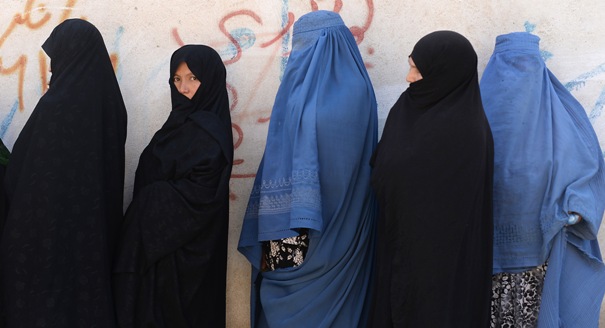The world treats Afghanistan as a doctor would treat a seriously ill child that nevertheless shows some signs of improvement. But that is only one side of the picture. The other, more cynical, side is the world’s wish to free itself of caring for this “child” as soon as possible. “Let it finally take care of itself,” thinks the world, “and we will be kind enough to provide the medicine.”
This attitude begot the condescending international reaction to the events surrounding the second round of the elections that took place on June 14. Had presidential elections claimed 46 lives in any other country, such a vote would have been considered a national tragedy, and the rest of the world would have shared this view. But when it comes to Afghanistan, where human life is still cheap, this number is not taken as seriously.
President Hamid Karzai, who will be replaced by a yet unknown successor in just a few weeks, believes that the fact that the elections took place is actually the main criteria for calling them successful. It is hard to argue with this assessment. Karzai is proud of Afghan security forces which were able to independently ensure that these elections occurred. Fair enough. Karzai decided not to thank the international community, particularly ISAF, for its assistance in training these forces. However, he did remember to ask the international community to continue its assistance to Afghanistan.
Understandably, Karzai wants to retain his influence inside Afghanistan and thus had to display intolerance toward the foreign occupiers, as the West’s representatives are referred to by their influential Afghan opponents. At the same time, he has to use his remaining influence to ensure that the world does not forget Afghanistan.
As for Karzai himself, he will go down in history as the first Afghan president who relinquished his post as a result of elections and stayed alive after doing that. (The words inshallah (God willing) seem fitting here). On the other hand, it is hard to disagree with Alexey Malashenko, who believes that “Afghanistan does not need Karzai now, and Karzai does not need Afghanistan.”
The only post-Soviet Central Asian country that conducted elections similar to the ones in Afghanistan is Kyrgyzstan. These elections also determined the future of its outgoing president. The country’s third president, Roza Otunbayeva, gave up her post refusing to run for reelection, but chose to remain in Kyrgyzstan. The first two Kyrgyz presidents, Akayev and Bakiyev, had been overthrown and fled the country.
Of course, should Karzai also choose to stay in Afghanistan, it will not only demonstrate his clan’s security but will also signify the country’s transition toward national—interclan, interethnic, interreligious and interregional—reconciliation.
Such a conclusion is especially warranted if Abdullah Abdullah emerges as the winner of the second round of the elections. It will mean that Abdullah, who is of mixed Pashtun and Tajik origin, got the majority of the vote among Afghanistan’s non-Pashtun population. However, Abdullah’s narrow-margin victory over his Pashtun opponent, the former finance minister in Karzai’s first government Ashraf Ghani, may lead to serious protests on the part of his supporters. For their part, Afghanistan’s well-organized ethnic minorities—Tajiks, Uzbeks, Turkmens, ans Hazaras—may rally around Abdullah in response to the protests. Such a standoff threatens to unleash a new round of destabilization in a country that has already suffered enough during its 35-year-long civil war.
The danger of this scenario becomes clear as soon as one remembers Afghanistan’s bloody internal conflict of the mid-1990’s. At that time, ethnic Tajiks—then Afghanistan’s President Burhanuddin Rabbani and his associate Ahmad Shah Massoud—were confronted by their former partners in the jihad against the Soviet invasion, Pashtun commander Gulbuddin Hekmatyar and subsequently the Taliban, Afghan Pashtuns’ main force.
Therefore, it is extremely important that the losing side behave responsibly: accepting one’s defeat will demonstrate the maturity of Afghan elites and lay the foundation for the democratic process of building Afghanistan’s civil society. Some analysts correctly believe that the new leader of Afghanistan is not likely to be particularly charismatic. In fact, this condition will guarantee forging of a national compromise which will preclude the emergence of an authoritarian regime in Afghanistan.
A stable Afghan regime is clearly in Russia’s interests, and if strengthening the country’s democracy will provide for stability, then Moscow should support this course. Judging by the signals coming from the Kremlin now, it does not really wish to get involved in Afghan events. Why this is the case is not that important. It may be for the lack of geopolitical ambitions or economic interests, or perhaps the “Afghan syndrome” (the tragic memories and fatigue from the Soviet war in Afghanistan) is still alive in Russia. The important thing is that Afghanistan may still need Moscow as its friend in the future.
Finally, if Moscow sincerely wants Afghanistan to return to peace and stability, then it should stop looking at this country through the prism of its present relations with Washington. Unfortunately, this approach has so far created a confused understanding of Russia’s interests in Afghanistan. Just a few years ago, the Kremlin’s main issue with the United States was the lack of a clear timetable for the American troop withdrawal from Afghanistan. When the Obama administration named the deadlines, Washington was asked to justify the UN Security Council mandate for its operation in Afghanistan. Now when the UN and NATO troop withdrawals are to become a reality in the next few years, Moscow calls this decision premature and claims it undermines stability in Afghanistan.
Such obvious inconsistencies in Russia’s positions seem quite awkward. But, perhaps, we demand too much from our politicians…
Arkady Dubnov is a political analyst and an expert on Central Asia.





